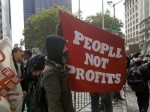
When I first heard of the “Occupy Wall Street” protests in mid-September, I was intrigued.
It’s always encouraging to see people becoming engaged in the political process and challenging the apathy that typifies younger American voters.
The movement raises issues that we can all likely agree upon. Wall Street has not behaved as a free market should. When business leaders run to the White House after their bets go bad and are awarded a bailout paid for by the American taxpayer, as we’ve seen happen now both under President Bush and President Obama, that’s not a free market.
The millions of unemployed and financially strapped Americans who were not able to secure such an arrangement have a right to be angry.
But at the same time, for better or for worse, the economic inequality in our country that these protestors rail against—without offering any clear solutions to—is an inevitable part of capitalism, a core value in our nation’s economic system.
Implicit in the very concept of the American dream is the reality that there will be those who are very wealthy, and that there will also be those who struggle.
As a college student working two jobs and receiving student loans to help defray the cost of my tuition, I’m sympathetic to those who fall into the latter category. We can provide a safety net to ensure that the most basic needs of all citizens are met, and encourage a strong civil society to help bear some of this burden.
But when we view wealth as a problem and take steps to excessively regulate that, as some within the Occupy movement would have us do, we are trouncing upon a cornerstone of our democracy and risk hampering the entrepreneurial spirit that has made the United States the powerful force that it is today.
The Occupy movement also prides itself on being a peaceful campaign but a Washington Post article recounting the efforts of activists in the DC area to “occupy” the Hart Senate Office Building, tells a very different story.
Protest organizer David Swanson told the publication, “[My band of followers and I will be] blocking down the elevators, blocking down the bathrooms . . . We’re going after the building precisely to inconvenience everybody who works there.”
Similarly, the local FOX affiliate in New York City reported on a hostile situation at a protest in Zuccotti Park last week, when a protestor threatened to stab one of their newscasters.
And on the other side of the country in Portland, Ore.’s Pearl District, hundreds of protestors defied a midnight curfew, while down the coast in San Francisco, the local health department has deemed the Occupy protests a public health hazard after observing excessive amounts of excrement and vomit at the site of their local Occupy protests.
Even in Nashville, protestors have been linked to instances of public urination, assault, and drug use outside Legislative Plaza. This is not how we effectively solve our problems in the United States.
As the Occupy Wall Street movement goes on seven weeks of operations, with many of the participants from the first days of the campaign still camped out in tents and partaking in protests, perhaps the best thing that many of the protestors could do would be to take a long shower, trade in their crepe-paper signs for a résumé and go back to their communities, assuming responsibility for their own personal success or failure.
Or at the very least, obtain a permit for their protests, respect the rule of law, and consider investing in a Porta-Potty.


